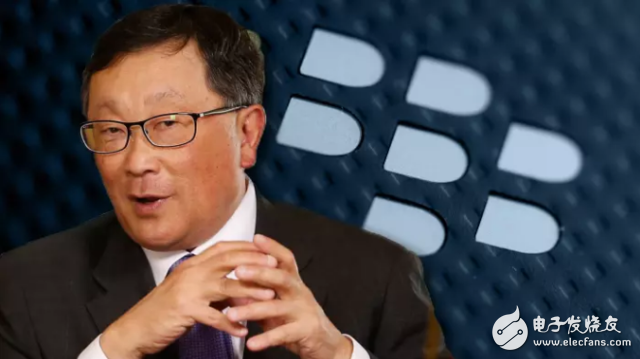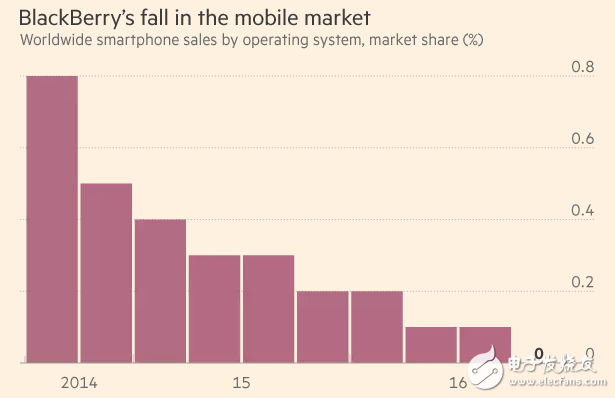Electronic enthusiasts eight o'clock: According to the "Financial Times" website, just six months ago, BlackBerry just made a decision not to produce its own brand of smart phones, the company's CEO, John Chen, now predicts: BlackBerry The smartphone will make a comeback.

CEO Cheng Shouzong (John Chen)
Blackberry used to be the dominant player in the smartphone market. Now it has licensed the brand to three “branded†mobile phone manufacturers in Indonesia, India and China. They hope to attract 14 million BlackBerry users worldwide to buy mobile phones – up to 80 million BlackBerry users at the peak.
Even so, Cheng Shouzong is satisfied with the decision to get the BlackBerry out of the highly competitive smartphone market. He is very happy to give up the hardware manufacturing of the BlackBerry, saying that the smartphone market has been "roaded", and the new models of other mobile phone manufacturers are "very boring."
When Cheng Shouzong talked about the homogenization of smart phones, he said, "There will definitely be new technologies, so let my colleagues deal with them."
Cheng Shouzong said that BlackBerry is "returning to the old line", focusing on security software, servers and productivity tools, and entering new areas including smart cars.
The Financial Times said that under the leadership of the pragmatic Cheng Shouzong, the BlackBerry transformation seems inevitable. According to the latest data from market research firm Gartner, in the fourth quarter of 2016, BlackBerry's share of the mobile operating system market was negligible. Blackberry has launched several Android phones, but the sales are flat, and it does not show the value of continuing investment.

On the contrary, Cheng Shouzong believes that the use of the local "manpower" of the partners - China TCL, Indonesia PT BB Merah PuTIh and India OpTIemus - means that the BlackBerry may come back - this is unlikely. He said, "From now on, the number of people who buy BlackBerrys will be more than the current one. My prediction is - of course I may be wrong, we will make a comeback in the mobile field."
If this strategy is successful, the licensing business will bring revenue to the BlackBerry, but not enough to make up for the losses caused by the exit of the mobile phone market. In the fourth quarter of 2012, BlackBerry revenue was $4.2 billion (approximately RMB 28.9 billion) – at the time, BlackBerry was still proud of the smartphone market. Five years later, BlackBerry's fourth-quarter revenue was only $286 million (about RMB 1.968 billion).
Cheng Shouzong, who took office on the eve of the collapse of the BlackBerry business in 2013, is not worried about this. He believes that he has completed the task of transforming the BlackBerry. "I am no longer in transition and are growing."
As evidence of the success of the transformation, since the success of Cheng Shouzong, the revenue of BlackBerry software and services business has increased from 100 million US dollars (about 690 million yuan) to 640 million US dollars (about 4.4 billion yuan). The fourth-quarter loss was narrowed to $47 million (approximately RMB 323 million) from $238 million (approximately RMB 1.637 billion) in the same period of the previous year. The expectation of turning losses into profit this year pushed BlackBerry shares up 12%.
Last week, the BlackBerry made a fortune: Qualcomm returned $815 million (about 5.6 billion yuan) in licensing fees – ironically, it was a “trophy†that failed in the smartphone market. Qualcomm's refund increased the BlackBerry cash reserve, laying the groundwork for a more aggressive acquisition strategy.
BlackBerry returns to the software and security business areas, reflecting the increasing sensitivity of the world to cybersecurity for unprotected handsets, especially in the office environment. Government agencies are still big customers of BlackBerry technology, and all G7 (G7) national government agencies use BlackBerry software.

According to the Financial Times, BlackBerry estimates that its "enterprise of things" technology market can reach US$17.6 billion (about RMB111.1 billion). Cheng Shouzong also hopes to follow Intel's "Intel Inside" strategy and launch similar sub-brands.
BlackBerry acquired QNX, a software vendor, in 2010 to enter the smart car market. BlackBerry and Ford work closely together, and Ford hired 400 BlackBerry employees this month to strengthen the development of its in-vehicle connectivity technology. Currently, BlackBerry software is used in 60 million vehicles.
BlackBerry is testing two self-driving cars and is expected to conduct road tests in Toronto at the end of the summer.
Cheng Shouzong admits that his efforts to get the BlackBerry out of the smartphone business are somewhat hindered by the brand. At the meeting, he was often asked questions about the new mobile phone. He once considered changing the company name back to "Research In MoTIon" and clearing the line with the "heritage" of the smartphone. However, he now ruled out the possibility of the company changing its name, saying that only "fragile" companies will change their names during the transformation process.
Cheng Shouzong said, "One joke is that if my son is not good enough at school, I will not change my son's name. Changing his name will not help improve his mathematics."
Disclaimer: The electronic reprinted works of E-Commerce Network are as far as possible to indicate the source, and all rights of the owner of the work are not transferred due to the reprint of this site. If the author does not agree to reprint, please inform the site to delete or correct it. Reprinted works may be subject to change in title or content.
Laptops,windows Laptops,win11 Laptops,win10 Laptops
Jingjiang Gisen Technology Co.,Ltd , https://www.gisengroup.com